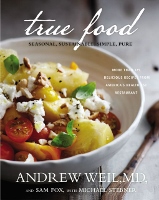 True Food (2012) is a recipe book that describes the menu of True Food Kitchen, based mainly on Andrew Weil’s Anti-Inflammatory Diet.
True Food (2012) is a recipe book that describes the menu of True Food Kitchen, based mainly on Andrew Weil’s Anti-Inflammatory Diet.
- Versions of this food are suitable for people on vegetarian, vegan, gluten-free, low fat, low carb, and paleo diets
- Plate proportion, large amounts of vegetables
- Fish and grass-fed beef/bison
- Truly wholegrains
- Mainly organic, local, seasonal
- Avoid processed foods; artificial sweeteners; flour; sugar; excessive salt; excessive animal fat, butter, cream, and eggs; polyunsaturated vegetable oils
Below is a description of the food recommendations in the diet. There’s a lot more in the book.
Get a copy of True Food for the full benefits of the plan, and for recipes.
The reasoning behind True Food
This book follows Andrew Weil’s Anti-Inflammatory Diet. This advises that the natural pigments that color vegetables and fruits; the antioxidants in olive oil, tea, and chocolate; the novel compounds in ginger, turmeric, and other spices and herbs; and the special fats in oily fish all protect our tissues and organs from inappropriate inflammation.
True Food – Andrew Weil diet plan – what to eat and foods to avoid
What to eat | Foods to limit or avoid
Foods to eat in True Food
- Mostly produce – a typical plate may be 9 ounces of vegetables and 5 ounces of animal protein.
- Produce
- All types of vegetables (black kale is recommended); a mix of raw and cooked
- Cold climate fruit including berries, cherries, apples, and pears. Sea buckthorn is considered one of the most nutritious, vitamin-packed fruits ever discussed
- Carbohydrates
- Carbohydrates are a small component of the diet
- True whole grains – brown rice, wild rice, corn, barley, wheat berries, bulgur wheat, buckwheat groats (kasha), quinoa
- Starchy roots and tubers including sweet potatoes, beans, and winter squashes
- Protein
- Legumes including whole soy foods, beans, lentils, and other legumes. Tofu is recommended
- Nuts
- Eat fish at least twice a week; choose oily varieties that give you anti-inflammatory omega-3 fatty acids (wild Alaska salmon, sardines, anchovies, herrings, arctic char, and black cod).
- Grass-fed, free range beef and bison
- Fats
- Olive oil is the main, recommended fat
- Coconut oil – virgin, non-hydrogenated – is quite heart healthy
- Beverages
- Tea is better than coffee – especially good-quality white, green, or oolong tea
- Other
- Desserts should only be occasional, and shouldn’t be excessively sweet
- Occasional chocolate – plain, dark, and at least 70% cacao
- Natural sweeteners including evaporated cane syrup, agave nectar, maple syrup, honey, erythritol
- Modest amounts of alcohol – red wine is the best choice
- Traditional foods from many cultures. Seasonal and local foods are recommended
- Organic foods, especially for produce on the “Dirty Dozen” list
- Cook briefly or at lower temperatures. Preferred methods are stir-frying, steam frying, steaming, and (for vegetables) roasting. If you grill meats, use leaner cuts and marinate them before cooking. Gas grills are good alternatives to those that use charcoal
Foods to avoid or limit with True Food
- Produce
- Minimize consumption of tropical fruits such as bananas, pineapple, mango, and papaya
- Carbohydrates
- Do not serve huge portions of carbohydrates
- Try to avoid processed and “pulverized” grains including flour
- If you have pasta and noodles, have small portions. Cook it until it is chewy, not mushy, to lower its glycemic load
- For people who need a gluten-free diet – avoid gluten-containing foods, found in wheat, barley, and rye
- Avoid sugar
- Avoid foods containing a lot of flour and sugar: bread, pastries, cookies, crackers, chips, sugary drinks, etc., also white potatoes; high glycemic-load foods
- Protein
- Eat fewer foods of animal origin, except for fish and high-quality dairy products like yogurt and natural cheeses. Eat less poultry, which contains pro-inflammatory fats
- Avoid fish varieties contaminated with environmental toxins such as shark, swordfish, marlin, and bluefish; also avoid overfished fish including grouper, black sea bass, rockfish, and most snapper; also Atlantic cod, Pollock, flounder, halibut, sole, and plaice
- Fats
- Avoid excessive animal fat, butter, cream, eggs, etc.
- Avoid polyunsaturated vegetable oils (especially refined soybean oil, common in industrial food products, margarine and other partially hydrogenated and trans-fats, and fats in the meat of cows and chickens raised on grain-rich diets
- Other
- Reduce salt
- Avoid artificial sweeteners and processed sugars including high fructose corn syrup HFCS – including soda
- Reduce fruit juice
- Cooking methods: Don’t blacken animal proteins as that process generates carcinogenic toxins. Avoid lighter fluid or self-starting packages of briquettes in a charcoal grill
Health benefits claimed in True Food
The diet in this book claims to reduce the risks for: Alzheimer’s disease, cancer, type 2 diabetes, heart disease, hypertension, inflammation, insulin resistance, nonalcoholic fatty liver disease, overweight/obesity, stroke
As always, this is not intended to be a replacement for professional medical diagnosis or treatment for a medical condition. Consult your doctor before starting a new diet. This page describes what the authors of the diet recommend – Chewfo is describing the diet only, not endorsing it.
Get a copy of True Food for the full benefits of the plan, and for recipes.
![]()
You can also see the “Anti Inflammatory Diet & Pyramid” at www.drweil.com. See www.truefoodkitchen.com for information about the True Food Kitchens restaurants.
How has this diet helped you? Please add a comment or question below.

{ 0 comments… add one }